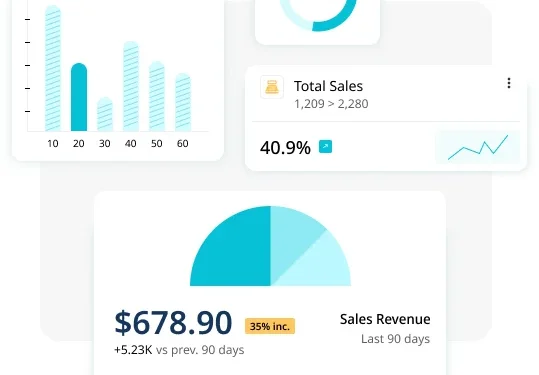Introduction
In today’s digital economy, businesses are increasingly under pressure to deliver fast and scale quickly, all while remaining agile in competitive markets. But when information is siloed in several departments, it can be hard for organizations to run smoothly. This is where ERP development companies come in.
Enterprise Resource Planning (ERP) integrates various business processes such as finance, human resources, supply chain, sales, and customer service into a single platform. With customized ERP development solutions, companies minimize inefficiencies, automate processes, and gain insights to make data-driven decisions.
ERP has evolved to a strategic necessity where, whether an SME or a global giant, a company needs an ERP, and it is no longer a technology decision like the past.
What Are ERP Development Services?
ERP software development services specialize in creating, configuring, and deploying adaptive ERP systems that fit a company’s workflow. Unlike generalised off-the-shelf software, bespoke ERPs have industry-specific modules out of the box.
Features of ERP Development Services:
Custom Apps: Inventory, HR, production, Finance, CRM.
Hub Database: The point of centralization as a database and information provider.
Automation: As manual errors are minimized and time is saved in mundane tasks.
Independent systems connectivity: Direct links to CRMs, payment solutions, or e-commerce solutions.
Cloud Versus On-Premise: It can be used either way, as per the needs of the organization.
Dashboard Analytics: Smart reporting for smart decisions.
Benefits of ERP Development Services
Streamlined Processes
ERP solutions consolidate workflows among different teams to promote better working together and ease centralized monitoring.
Real-Time Insights
Custom reports, a fact-based dashboard, and data driven floor space offer an insight into fact-based data for immediate and more intelligent decisions.
Increased Productivity
Employees are freed to do higher value work by automated routine tasks such as payroll, billing and scheduling.
Cost Savings
Advantages of ERP development services: Remove redundancy from the system: implementing ERP services helps in reducing the redundancy or duplications of processes of an organization.
Scalability
ERP scales as a business grows, changing with new modules, users, or market expansion.
Industry Uses of ERP System Development Services
Industry-neutral, ERP systems are used in various sectors:
Manufacturing: Automation of production line, quality control, and supply chain.
Retail & E-Commerce: Live access to inventory, sales data, and customer preferences.
Healthcare: Ease the Patient Management, Compliance Reporting, and Medical Resource planning.
Financial: Provides transparency in audits, financial records, and real-time reporting.
Education: Oversees admissions, student records, and administrative affairs.
Logistics: Next-level fleet management, route planning, and warehouse optimization.
These instances illustrate that ERP development services are the key to productivity across markets.
Development Process of ERP Systems
To avoid that, ERP development companies have a well-defined process they should stick to:
Requirement Analysis: Understanding the organization’s pain points and requirements.
Planning & System Design: Module and enterprise workflows as well as blueprints.
Custom Development: Plugin for a site-related functionality.
Integration Stage: API connectivity with other third-party software.
Testing: Security, smooth operation, and compliance.
Rollout: Organization-wide deployment — cloud or on-premise.
Maintenance & Support: Updates and upcoming features.
Best Practices of ERP Development Services
Define Specific Objectives (goals): You should have a set of one or more objectives that define how your ERP supports your business.
Engaging stakeholders: Include the people who will be using it to get better adoption.
Put focus on security: Integrate security by design of encryption, access control l and regulatory compliance.
Utilize Agile Methodologies: Formulate incremental releases for rapid usability.
Staff Training: Frequent ongoing training for ease of use and implementation.
IMPLES adopt these best practices to make the most out of their Enterprise Resource Planning development services.
Trends in ERP Development Services in the Future
The world of ERPs is changing fast, driven by technological trends such as:
Cloud ERP Adoption: Increasing SaaS ERP preference as more SaaS ERP’s provide expanded versatility.
AI-Powered ERP: Artificial intelligence engines delivering predictive analytics and enhanced automated processes.
ERP Mobility: Users executing ERP functions with their mobile devices.
IoT-driven ERP: Capture data from connected devices as they occur.
Vertical-Specific ERP: Industry-specific ERP for healthcare, finance and manufacturing with compliance factors inherent.
These trends show that ERP development services are entering an intelligent, agile and scalable new age.
Reasons Why Businesses Should Cause ERP Development to Be an Integral Part Of Their Strategy
Businesses that embrace ERP face a sustainable advantage:
Better Transparency: All the data of our clients and their students is at one place, makes decisions much more accurate.
Compliance: ERP simplifies adherence to laws and regulations.
Better Customer Service: Providing better customer service by better tracking of orders and communicating more effectively with customers.
Future Agility: Firms can respond rapidly to incipient opportunities.
Investing in the development of ERP services helps your business be ready for all of what today and tomorrow have to offer.
How to Select the Best ERP Development Partner
All ERP solutions are not created with the same level of customization or support. When choosing, businesses should consider:
- Track record in ERP implementations.
- Industry-specialized ERP solutions.
- Flexibility in integrations and scalability.
- Dedicated post-deployment support.
- Data security and compliance adherence.
With ERP development companies, you have a perfect partner that makes ERP not just a productivity tool but an intrinsic driver of growth.
Conclusion
In a world of globally connected enterprise, ERP development services are no longer a luxury but a necessity. ERPIt is about streamlining systems, automating processes and sharing key information in real time, improving efficiency and boosting productivity and innovation.
ERP systems have transformed from being a luxury to a requirement across industries, including retail, healthcare, logistics, and manufacturing. With innovations such as cloud ERP, AI in ERP, and IoT in systems, the ERP will continue to play an even stronger role in defining the businesses of the future.












